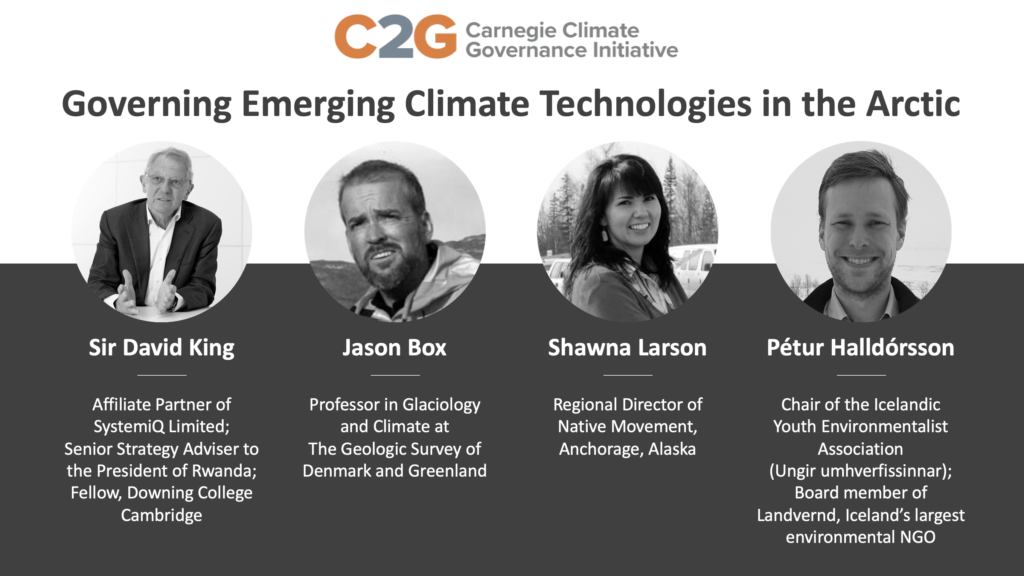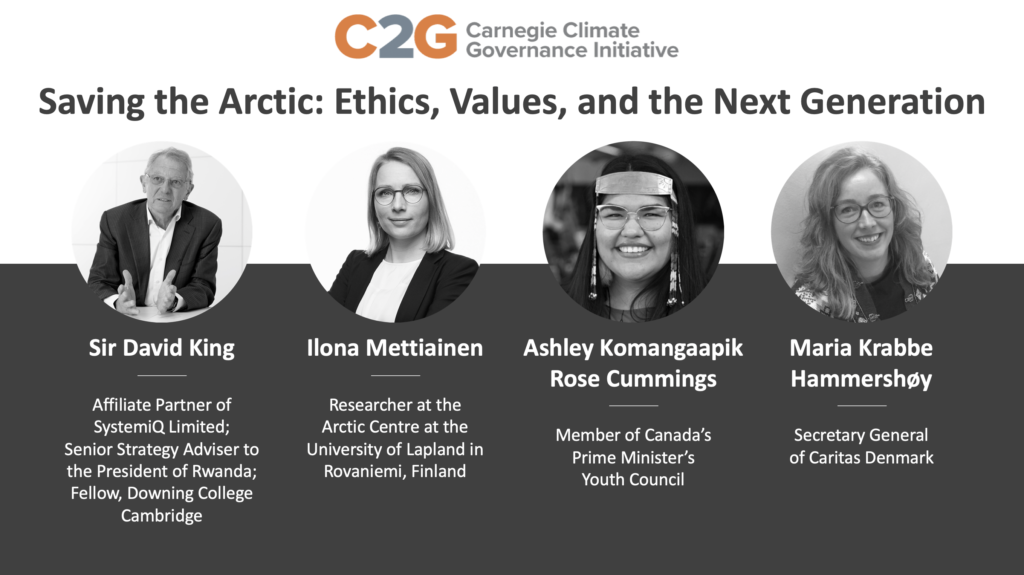Media Advisory: Governing climate-altering technologies in the Arctic, risks and challenges
What: Two panel discussions on governing climate-altering technologies in the Arctic
Where: Kaldalón room, Harpa Ground Level, Arctic Circle Assembly, Iceland
When: October 10, 2019. First panel at 17:15 – 18.15; Second panel at 18.30- 19:30
(October 9, 2019) The Arctic continues to warm faster than any other region, with potentially profound consequences for the entire planet. To counter or slow this trend, some scientists are exploring the use of emerging climate-altering technologies. This raises important questions regarding the governance of these technologies and the ethics of their potential testing and use. Proposed ideas include spreading reflective silica spheres on the ice, brightening clouds above the ocean, and spraying reflective aerosols into the stratosphere to cool temperatures. Other technologies seek to restore ice to repair the Arctic ecosystem, or engineer glaciers with the aim of minimizing sea level rise.
Many policymakers are unaware of these developments or are poorly informed, and existing governance is spotty and not well coordinated. All of these technologies come with costs and risks as well as potential benefits. Key questions include: what research is needed; should tests be conducted; and, importantly, who decides, based on what criteria and under whose governance authority? How does society decide whether ‘saving the Arctic’ justifies the testing and use of risky emerging technologies that would not only affect the Arctic, but over time have global impact?
The Carnegie Climate Governance Initiative (C2G) is hosting two sessions on October 10th at the 2019 Arctic Circle Assembly, where scientists, policy experts, indigenous activists and other civil society representatives will explore some of the toughest questions facing decision-makers today as they contemplate the future of the Arctic.
Governing Emerging Climate Technologies in the Arctic (17.15-18.15) will explore which emerging climate technologies researchers are considering, what their effective governance might include, and their implications for the region and the world. Speakers include the former chief scientific adviser to the UK government, Sir David King; Professor in Glaciology and Climate at the Geologic Survey of Denmark and Greenland, Jason Box; Icelandic Youth Environmentalist Association chair, Pétur Halldórsson and Regional Director for the Native Movement based in Alaska, Shawna Larson.
Saving the Arctic: Ethics, Values and the Next Generation (18.30-19.30) will look at the role ethics and values play in shaping decisions on the testing and use of potentially controversial technologies in the Arctic. In seeking to protect the Arctic with climate-altering technologies, are we opening a Pandora’s box for generations to come? Speakers include the former chief scientific adviser to the UK government Sir David King; University of Lapland Arctic Centre researcher Ilona Mettiainen; Canada’s Prime Minister Youth Council member Ashley Komangaapik Rose Cummings; and Caritas Denmark Secretary-General Maria Krabbe Hammershøy;
C2G Senior Strategy Director, Cynthia Scharf, will moderate both sessions.
For more information, check out our landing page here, or contact Celine Novenario at [email protected]
About Carnegie Climate Governance Initiative
The Carnegie Climate Governance Initiative (C2G) is an initiative of the Carnegie Council for Ethics in International Affairs. It seeks to catalyse the creation of governance frameworks for emerging climate-altering technologies: in particular, for solar radiation modification and large-scale carbon dioxide removal. C2G is impartial regarding the research, testing or potential use of emerging climate-altering technologies, believing these are choices for society to make.

